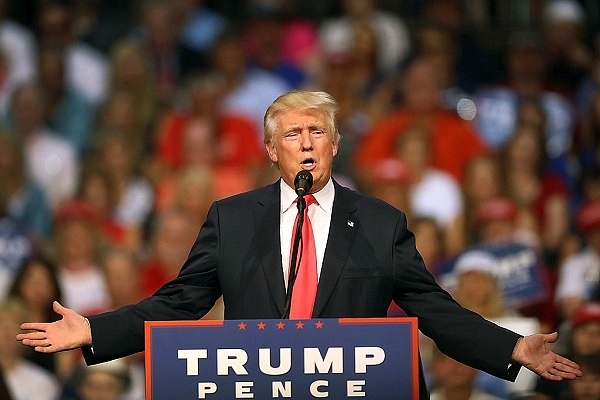World
Why Trump’s Brave Departure From Republican Economic Orthodoxy Should Cheer The Left
- Trump is moving away from Republican orthodoxy by opposing trade deals, calling for protection against currency manipulation, renegotiating NAFTA, etc.
- In doing so, he is clearly pushing the Republican Party closer to the Democrats than ever before in terms of economic policy.

Image Credit: Joe Raedle/Getty Images
Recently, Donald Trump announced his 13-member economic team, comprising mainly billionaire businessmen and chief executive officers (CEOs). The mainstream media was quick to point out that no academic economist found place in his team.
That should be enough to silence his critics. He doesn’t want to listen to armchair academics and ‘no skin in the game’ commentators. The old media doesn’t get it.
Coming to the specifics. Trump’s earlier economic plan, unveiled during the primaries, would have added more than $10 trillion to the United States’ national debt, as per various independent estimates. However, his latest would add only about $2 trillion.
Consider these proposals from his new plan.
- He wants to drastically bring down the number of tax brackets to just three: 12 percent, 25 percent and 33 percent. Currently, the highest income tax bracket in the US is 39.6 percent.
- He plans to lower the tax rate for corporations and small businesses to 15 percent - down from the current top bracket of 39 percent.
- He vows to restart the Keystone XL pipeline project.
These proposals look a lot similar to that of House Speaker Paul Ryan and the policy agenda of the last Republican presidential candidate, Mitt Romney. Various critics now accuse Trump of appropriating the same neoliberal, small government, trickle-down Reaganomics of the conservative elites that he rallied against during the primaries.
Conservative Republicans believe in limiting the role of the government by drastically reducing public spending and cutting down debt. However, successive Republican presidents have failed to achieve these objectives.
Cutting tax, reducing bureaucracy and doing away with regulations that stifle businesses are other key focus areas of their economic policy.
The party’s pro-business image has made blue collar workers the favourite vote bank of the Democratic party. For long there have been calls within the Republican party to move away from neoliberal policies, and shift focus to the welfare of the working class. Some party leaders like Senator Mike Lee of Utah, a close friend of Ted Cruz and the first to endorse him for President, are for giving bigger tax breaks to families with children. He has batted for tweaking labour laws to help working parents get flexible schedules.
Donald Trump, who ran a populist campaign targeting blue collar Republican voters, was able to defeat 16 opponents, most of them subscribers of conservative economic orthodoxy.
No wonder the elites in the party despise him. Winning or losing is one thing, but Trump is not doing just that. He is fundamentally changing the party. He is dismantling Reaganomics brick by brick, and children of the Reagan revolution cannot stand that.
Unlike his predecessors, big businesses are not bankrolling Trump’s campaign. He has been able to amass millions of dollars in small donations, an unparalleled feat in the history of American politics.
But now he is also making overtures to wealthy donors and big funders in the Republican establishment.
In his economic plan, Trump has incorporated traditional Republican talking points, such as repealing the estate tax and reducing the number of federal regulations.
But what is truly brave is his departure from Republican orthodoxy in terms of rejecting trade deals. He vows to slap tariffs against any countries that cheat by unfairly subsidising their goods. He vows to renegotiate North Atlantic Free Trade Agreement (NAFTA) and calls for strong protection against currency manipulation. He also wants the US out of the Trans Pacific Partnership (TPP) Agreement.
And, Lee’s proposal of giving bigger tax breaks to families with children finds place in Trump’s economic plan.
No conservative Republican has spoken against free trade since at least the 1980s. No matter how much the Democrats complain about the obstructionism of Republican Congress, when they fall short of consensus within their own party for trade deals, it is usually these same Republicans who bail them out. Trump’s Republican party is set to change that.
Trump is to the left of Hillary Clinton on this front. She will try to paint him as just another subscriber of trickle-down economics, given his proposed major tax cuts, but what she won’t tell is that he also wants to do away with all direct taxes on poor Americans.
Some of Trump’s rhetoric is abhorrent. But he has moved the Republican party closer to the Democrats than ever before as far as economic policy is concerned. In this sense alone, there has hardly ever been a greater unifier than him in recent American political history. It would be a huge mistake for those on the Left to not celebrate his success.
Introducing ElectionsHQ + 50 Ground Reports Project
The 2024 elections might seem easy to guess, but there are some important questions that shouldn't be missed.
Do freebies still sway voters? Do people prioritise infrastructure when voting? How will Punjab vote?
The answers to these questions provide great insights into where we, as a country, are headed in the years to come.
Swarajya is starting a project with an aim to do 50 solid ground stories and a smart commentary service on WhatsApp, a one-of-a-kind. We'd love your support during this election season.
Click below to contribute.
Latest